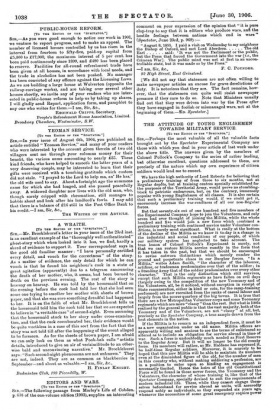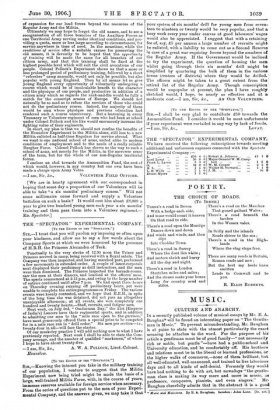THE ATTITUDE OF YOUNG ENGLISHMEN TOWARDS MILITARY SERVICE.
(To THE EDITOR Or THE "SPECTATOR."]
SIR,—Perhaps the most valuable of all the valuable facts brought out by the Spectator Experimental Company are those with which you deal in your article of last week under the above title. The answers given by the members of Colonel Pollock's Company to the series of rather leading, bat otherwise excellent, questions addressed to them, are precisely of the nature which my own experience of citizen soldiers would lead me to expect.
We have the high authority of Lord Roberts for believing that a preliminary training of from three to six months, not at Regular depots, but at training centres specially established for the purposes of the Territorial Army, would prove no stumbling- block to patriotic endeavours, but, on the contrary, immensely popular with young Englishmen of all classes. It is also certain that such a preliminary training would, if we could get it, enormously increase the war-readiness of all our non-Regular forces.
But that seventy-six out of one hundred and five members of the Experimental Company hope to join the Volunteers, and only seven had ever thought of joining the Militia, while the whole hundred and five would join a new force which combined a preliminary training with continued service under Volunteer con- ditions, is surely most significant. What is really at the bottom of the decline of the Militia as we know it to-day is a change in the industrial and social conditions of our people, of which our military system has neglected to take account. The true lesson of Colonel Pollock's Experiment is surely, not that we can restore Militia service exactly in the form that it has taken in the past, but that we should be encouraged to revise outworn distinctions which merely cumber, ground and perpetuate chaos in our Burgher forces. "In a Militia," writes Adam Smith, " the character of the labourer, artificer, or tradesman predominates over that of the soldier ; in a Standing Army that of the soldier predominates over every other character.' That is the only distinction which still survives, except that such Militia regiments as have fallen on evil days (largely owing to the competition of the new Yeomanry and of the Volunteers, all, be it noticed, without exception in receipt of State remuneration, either in kind or coin, for the camp-training performed) are now recruited from the ranks of casual labour and largely from the poorer quarters of the big towns. It is true that there are a few Metropolitan Volunteer corps and some Yeomanry regiments which are more "classy" than the rest. But what is little realised by the general public is that the vast majority, both of the Yeomanry and of the Volunteers, are not "classy" at all, but, precisely as the Spectator Company, a true sample drawn from the best elements in the nation.
If the Militia is to remain as an independent force, it must be as a new organisation under an old name. Militia officers are apparently willing and anxious to see the terms of enlistment so altered as to include an obligation for service abroad in time of war. Such a foree is undoubtedly much needed as First Reserve to the Regular Army. But it will no longer be the old county force. Its members will rather, as Mr. Haldane has expressed it, be half-time Regular soldiers. Moreover, it is scarcely to be hoped that this new Militia will be able to maintain its numbers even at the diminished figure of the old, for the number of men in this country who, without making soldiering a profession, are in a position to enter upon so binding an engagement is necessarily limited. Hence the heirs of the old Constitutional Force will be found in those newer forces, the Yeomanry and the Volunteers, the character of whose training is, like that of the Spectator Company, specially devised to suit the requirements of modern industrial life. These, while they cannot engage them- selves beforehand for service abroad as units, will assuredly respond nobly as individuals, as they responded six years ago, whenever the necessities of some great emergency require power
of expansion for our land forces beyond the resources of the Regular Army and the Militia.
Ultimately we may hope to forget the old names, and to see a reorganisation of all three branches of the Auxiliary Forces as one Territorial Army serving under identical conditions, and pro- viding a quota, more or less large according to circumstances, for service anywhere in time of need. In the meantime, while the conditions of service offer a suitable excuse for preserving the old names, it is devoutly to be hoped that the opportunity of training will be made the same for all branches of our citizen army, and that this training shall be fixed at the highest possible level which will suit the civil avocations of our people. Colonel Pollock's Experiment shows us that a more or less prolonged period of preliminary training, followed by a short "refresher" camp annually, would not only be possible, but also popular with young England. Then by all means let us give young England every opportunity of voluntarily undergoing a course which would be of incalculable benefit to the character and the physique of our people, and productive in addition of a citizen army which as regards the rank-and-file would be fully a match for the conscript armies of Europe. We should not naturally be so mad as to refuse the services of those who could not do the preliminary course. Indeed, the majority of them would be men whose physique and previous education had rendered such a course unnecessary. But a leavening in every Yeomanry or Volunteer regiment of men who had been at school under Colonel Pollock and his like would enormously increase the fighting value of their regiments. In short, my plan is that we should not confine the benefits of the Hounslow Experiment to the Militia alone, still less to a new Militia enlisted as half-time Regulars for service abroad. What we want is one national school of arms, suited alike to modern conditions of employment and to the needs of a really reliable Burgher Force. Colonel Pollock has shown us the way to such a school of arms, not merely for the Militia, in the narrower sense of the term, but for the whole of our non-Regular territorial forces.
I enclose an obol towards the Ammunition Fund, the cost of which would, however, in any country but our own have been made a charge upon Army Votes.
—I am, Sir, &c., VOLUNTEER FIELD OFFICER.
[We are in hearty agreement with our correspondent in hoping that some day a proportion of our Volunteers will be able to take "-a six months' preliminary course." Will not some millionaire come forward and supply a Volunteer battalion on such a basis P It would cost him about £8,000 a year to give two hundred young men each year a six months training and then pass them into a Volunteer regiment.— ED. Spectator.]



























































 Previous page
Previous page